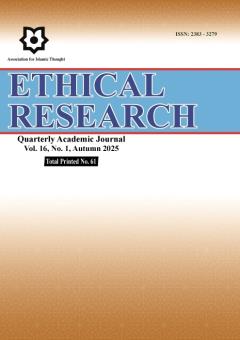Studying Ethical Concepts, Sources and Criteria in New Avesta
Subject Areas : Ethics and Islamic Education
1 -
Keywords: Ethics, Zoroastrian, New Avesta, Ethical concepts, Ethical Sources, Ethical Criteria. ,
Abstract :
The "New Avesta" which includes the largest volume of the "Avesta", contains heterogeneous books in terms of language and content that were apparently written during the social stability of the Zoroastrian society. This article tries to examine the ethical concepts (the semantics of virtue and vice), epistemological sources (virtues and vices de facto) and ethical criteria (Virtue or Deontological or Teleological Ethics) in New Avesta in a coherent manner. The method of this research is descriptive-analytic and library-based for collecting information. at the end, Virtue in "New Avesta" is defined as the correct function of social class by each person, and the definition of Vice is vice versa. The dominant ethical criterion is Virtue Ethics based on Consequentialism. The ethical virtues and vices are generally religious.
اوستا: کهنترین سرودهها و متنهای ایرانی. (1391). ترجمه جلیل دوستخواه، تهران: مروارید، چ 16.
بویس، مری. (1388). «ریشههای فلسفهی زرتشتی»، در کتاب جستاری در فلسفهی زرتشتی(مجموعهی مقالات)، ترجمه سعید زارع(و دیگران)، قم: دانشگاه ادیان و مذاهب.
_________، (1394)، «مردم اوستایی»، در کتاب مقالاتی چند دربارهی اوستا، ژان کلنز (و دیگران)، ترجمه سید سعید رضا منتظری(و دیگران)، قم: نشر ادیان.
بهار، مهرداد. (1391). پژوهشی در اساطیر ایران، تهران: آگه.
پورداود، ابراهیم(مترجم و مفسر). (1310). خرده اوستا، بمبئی: انجمن زرتشتیان ایرانی بمبئی و انجمن ایران لیگ بمبئی.
___________(مترجم و مفسر). (1347). یشتها؛ گزارش پورداود، تهران: کتابخانه طهوری.
پولادی، کمال. (1385). تاریخ اندیشه سیاسی در ایران و اسلام، تهران: مرکز.
پیگولوسکایا، نینا (و دیگران). (1353). تاریخ ایران (از دوران باستان تا پایان سدهی هجدهم میلادی)، ترجمه کریم کشاورز، تهران: پیام، چ 3.
دوشنگیمن، ژاک. (1381). دین ایران باستان، ترجمه رویا منجم، تهران: علم، چ 2.
زروانی، مجتبی، رضوی صوفیانی، عظیم. (1398). «بررسی اخلاق دینی و شناخت منابع و معیارهای اخلاقی در گاهان»، پژوهشنامه اخلاق، ش 45، 33- 42.
زنر، آر. سی. (1389). طلوع و غروب زردشتیگری، ترجمه تیمور قادری، تهران: امیرکبیر، چ 3.
فرانکنا، ویلیام کی. (1392). فلسفه اخلاق، ترجمه هادی صادقی، قم: کتاب طه، چ 4.
قانعی، مهناز. (1390). اخلاق در نگاه مولانا؛ هستی و چیستی، تهران: نگاه معاصر، چ 2.
کربن، هانری. (1391). چشماندازهای معنوی و فلسفی اسلام ایرانی(جلد دوم): سهروردی و افلاطونیان پارس، ترجمه انشاالله رحمتی، تهران: سوفیا.
_________. (1394). زمان ادواری در مزدیسنا و عرفان اسماعیلیه، تالیف و ترجمه انشاالله رحمتی، تهران: سوفیا.
کرینبروک، فیلیپ. (1388). «اخلاق و جامعه در فلسفه زرتشتی»، در کتاب جستاری در فلسفهی زرتشتی(مجموعهی مقالات)، ترجمه سعید زارع (و مترجمان)، قم: دانشگاه ادیان و مذاهب.
کلنز، ژان. (1394). مقالاتی درباره زردشت و دین زردشتی، ترجمه احمدرضا قائممقامی، تهران: فرزان روز، چ سوم.
هولمز، رابرت. (1394). مبانی فلسفه اخلاق، ترجمه مسعود علیا، تهران: ققنوس، چ 4.
Bowker, John (1997). "Avesta", in the Oxford Dictionary World Religions, Oxford University Press, New York, pp.114- 115.
Boyce, Mary (1987). "Priests, Cattle and Man", in Bulletin of the School of Oriental and African Studies, University of London, Vol.50, No. 3, pp. 508-526.
Boyce, Mary (1990). Zoroastrianism, the University of Chicago Press, Chicago.
Gnoli, Gherardo (2005). "Avesta", trans. Roger DeGaris, in Encyclopedia of Religion, ed. Lindsay Jones. 2nd ed., vol. 2, Thomson Gale, Detroit, pp. 708- 710.
Jackson, A. V. Williams (1909). "Avesta", in Encyclopedia of Religion and Ethics, vol. 2, T. & T. Clark, Edinburgh, pp. 266- 272.
Lovin W. Robin (2005). “Moral Theories”, in The Blackwell Companion to Religious Ethics, ed. William Schweiker, Blackwell publishing, London, pp. 19- 26.
The Gathas of Zarathustra, (1975). tans. & edit. & commentary Stanley Insler, Vol. 1 of Acta iranica, E. J. Brill, Tehran & Liege.
The Zend Avesta, (1887). L. H. Mills (trans.), Sacred Books of the East, F. Max Müller (ed.), vol 31, Clarendon Press, London.

